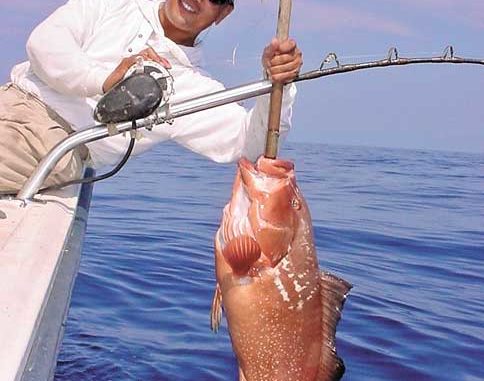
Even though N.C. anglers have few problems catching bottomfish, the SAFMC says they’re overfished. And that means changes are coming.
Bait thieves had been pecking at a big chunk of bait that Capt. Mike Webb had positioned beside a rock ledge about 95 feet below the anchored Pelagic Too when they suddenly stopped, indicated by a motionless rod tip.“Well, either they got all my bait or a grouper has come over to check it out,” Webb said.
“I’ll let it sit a minute to see if that’s the case and if I don’t get
a bite I’ll be reeling up to puton more bait.”
As Webb continued to explain that grouper and bait thieves have a sort of big-dog/little-dog relationship (the little dogs get things stirred up then the big dog comes out to end it), his rod made a pronounced dip, and Webb struck back.
The rod immediately doubled over, and Webb and the Precision Auto Reel strained to wrestle a grouper off the bottom. It was a dead heat for about half a minute, but the ragged pulsing of the rod slowed and the electric reel began turning a little rather than bogging as Webb began to slowly gain line.
He retrieved about 30 feet of line and the reel bogged again while the rod tip was jerked downward.
“This is why I prefer to fish natural bottom rather than wrecks,” Webb said. “Sometimes a big grouper will fake you out coming off the bottom and let you think you’ve got him. As soon as he feels you relax a little, he makes one of these moves. If you haven’t cleared him past all the structure, he’ll lunge into something and hang you up or break you off.”
The Pelagic Sportfishing of Atlantic Beach captain (252-222-4659 is one of a growing number of charter operators who offer grouper and other offshore bottom fishing as an alternative to traditional trolling charters.
He primarily targets gag and red grouper, part of a fisheries group the South Atlantic Fishery Management Council considers shallow-water groupers. While anglers indicate they haven’t had difficulty locating and catching shallow-water groupers, the SAMFC said the species are currently being overfished. The agency plans to implement serious measures to reduce catches, beginning Jan. 1, 2009.
Webb fishes for grouper in a couple of ways that are primarily chosen by his client’s level of skill then differentiated by rigs.
Grouper sometimes bite so subtly they’re extremely difficult to detect, and some anglers don’t quickly develop or remember this touch. For novices, Webb uses a rig with a single bait and a circle hook (see diagram).
As with other circle-hook rigs, the fish sets the hook as it moves off. For customers with a good feel for grouper or those who prefer to use J-hooks and set their own hooks, Webb uses a double-drop J-hooked rig and two baits (see diagram).
Once he locates a section of potentially productive bottom, Webb anchors to position his boat over the fish. Anchoring properly often is the most difficult part of grouper fishing as wind and current aren’t always in the same direction and can swing the boat so it doesn’t set up on the anchor as expected.
Grouper are structure-oriented, so missing the intended spot by even a few feet can be enough they don’t find baits to bite. It’s much like fishing for bedding bream, just with bigger baits for bigger fish.
Smaller fish and bait thieves often attack grouper baits as soon as they settle on the bottom. But small fish have machine-gun-like rat-a-tat-tat bites and, with a little experience, are easy to tell from grouper bites.
Grouper bites vary from feeling like a runaway freight train snagged a bait to being so light they only feel like a little added weight or the angler’s line is rubbing against something.
Webb said once a grouper is hooked, it’s important to immediately get the fish away from structure. Hooked grouper will dive for available cover and hole up to chafe the line on rough edges of structure.
Anglers shouldn’t stop to rest either. If an angler relaxes and a grouper gets its tail above its head and is pointed down, the angler usually won’t turn it around in time to win round two.
A variety of species — sea bass, beeliners (vermilion snapper), grunts, triggerfish, amberjacks, sharks, king mackerel, cobia, misplaced tuna — are likely to interrupt grouper anglers. However, if the bite slows greatly, it’s time to relocate.
Relocating usually isn’t difficult, unless the move will be a fair distance. For short moves, Webb just motors ahead slowly at a slight angle to his anchor line and uses his twin outboards to pull it free and to the surface. Maintaining the tow angle keeps the anchor line from tangling on the boat or in the props as he moves to a new spot.
Once Webb locates the next spot, he circles until he has the anchor where he wants it to fall then reverses the motors to create slack in the line and allow it to drop. He uses a custom 45-pound anchor and 30 feet of 3/4-inch chain, so it certainly isn’t something anyone would want to handle for every move.
Seeing Webb maneuver while locating the next spot and “trolling“ the anchor is almost worth the cost of a charter. It definitely shows years of experience.
Pulling up an anchor at the end of the day is almost as easy. Webb clips an anchor ball to the anchor line and moves forward. When the anchor breaks free, the anchor ball slides down the line and floats the anchor and chain just below the surface while Webb coils the anchor line back into its locker. He does have to lift the anchor and chain into the boat, but most of the heavy lifting has been done by the motors and anchor ball. That’s probably a good thing too, especially after playing tug-of-war with heavy groupers all day.
EDITOR’S NOTE: Just before press time, Sen. Elizabeth Dole asked the Secretary of Commerce to override the interim rule the SAFMC requested that will close grouper season in January, February, March and April.

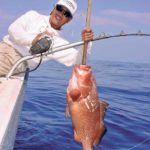
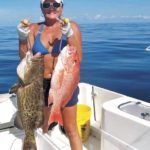
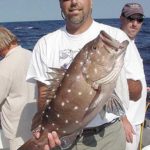
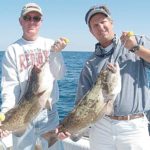
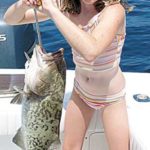

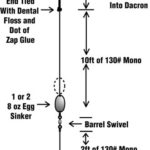



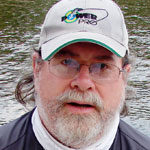
Be the first to comment